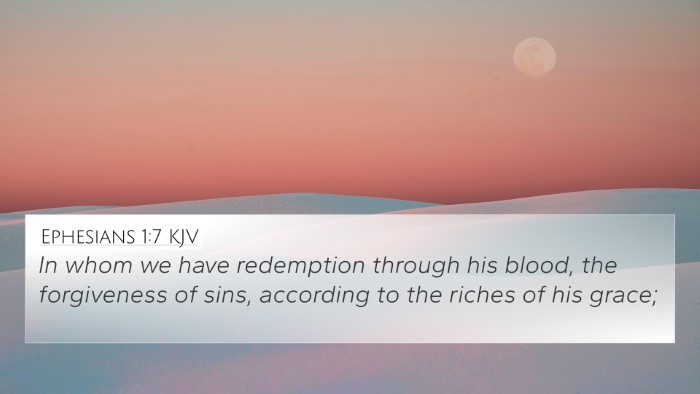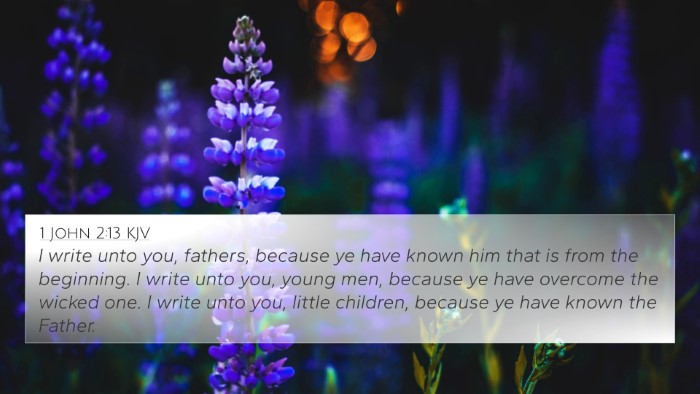Understanding 1 John 2:12
In 1 John 2:12, the Apostle John writes words of encouragement and assurance to his readers, emphasizing the different stages of spiritual growth among believers. This verse states: "I write unto you, little children, because your sins are forgiven you for his name’s sake."
Commentary Insights
This verse can be analyzed through the insights provided by public domain commentaries.
Matthew Henry’s Commentary
Matthew Henry emphasizes the affectionate language here. The term "little children" denotes not just a literal age, but a phase in spiritual maturity. Henry explains that this acknowledgment of sins forgiven is foundational to Christian faith. It emphasizes that salvation is not based on one's merit but on the name of Jesus, bringing out God's grace and mercy.
Albert Barnes’ Notes
Albert Barnes focuses on the phrase "for his name’s sake," noting the importance of Christ's authority and the meaning of forgiveness in the context of divine grace. Barnes points out that John addresses the "little children" first as a metaphor for new believers who experience the joy of forgiveness. He highlights that the assurance brought by this forgiveness is a major encouragement in the believer's walk with God.
Adam Clarke’s Commentary
Adam Clarke discusses the significance of the term "forgiven." He suggests that recognizing one's sins and understanding the nature of forgiveness are crucial for growth in faith. Clarke relates forgiveness with the transformative power of God's love, making it essential for the believer to understand their identity in Christ.
Key Themes
- Spiritual Growth: The notion of "little children" invites readers to contemplate their spiritual maturity and development.
- Forgiveness: Central to the message is the grace of forgiveness, which is a vital theme in Christianity.
- Identity in Christ: Understanding forgiveness helps believers find their identity and worth in Jesus.
- Assurance: The verse reassures believers of their forgiven status, providing a foundation of hope and security.
Related Bible Verses
This verse relates to several other scripture passages, enhancing the understanding of forgiveness and spiritual growth:
- Psalm 103:12 - "As far as the east is from the west, so far hath he removed our transgressions from us."
- Colossians 1:14 - "In whom we have redemption through his blood, even the forgiveness of sins."
- John 1:12 - "But as many as received him, to them gave he power to become the sons of God, even to them that believe on his name."
- Ephesians 1:7 - "In whom we have redemption through his blood, the forgiveness of sins, according to the riches of his grace."
- Acts 10:43 - "To him give all the prophets witness, that through his name whosoever believeth in him shall receive remission of sins."
- Romans 8:1 - "There is therefore now no condemnation to them which are in Christ Jesus."
- 1 John 1:9 - "If we confess our sins, he is faithful and just to forgive us our sins, and to cleanse us from all unrighteousness."
Cross-Referencing Biblical Texts
The spiritual journey of believers can be mapped through cross-references, guiding one to a deeper understanding of the Bible’s interconnectedness. By employing tools for Bible cross-referencing and understanding the connections between Bible verses, believers can enrich their scriptural study:
- Bible Concordance: This can help locate related verses for deeper study.
- Cross-reference Bible Study: Engaging in such study methods allows for a comprehensive view of themes across different scriptures.
- Bible Cross-reference System: Employing a noted system can simplify tracing themes like forgiveness and grace.
- Intricate Study: Exploring historical context, Paul’s epistles, and the Old Testament enhances understanding of the New Testament.
Conclusion
1 John 2:12 serves as a pivotal reminder of the foundational aspect of Christian faith: the assurance of forgiveness through Christ’s name. This promise nurtures believers in their spiritual journey. By studying related scriptures and employing cross-referencing techniques, one can gain a holistic perspective on God's mercy and call on believers to embrace their identity as His children. The thematic connections illuminated through this verse and others provide a rich tapestry of understanding that encourages deeper worship and relationship with God.























